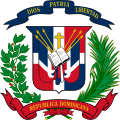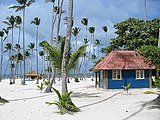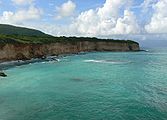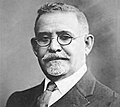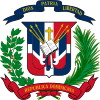Portal:Dominican Republic
Introduction
The Dominican Republic is a country on the island of Hispaniola in the Greater Antilles archipelago of the Caribbean Sea, bordered by the Atlantic Ocean to the north. It occupies the eastern five-eighths of the island, which it shares with Haiti, making Hispaniola one of only two Caribbean islands, along with Saint Martin, that is shared by two sovereign states. It is the second-largest nation in the Antilles by area (after Cuba) at 48,671 square kilometers (18,792 sq mi), and second-largest by population, with approximately 11.4 million people in 2024, of whom approximately 3.6 million live in the metropolitan area of Santo Domingo, the capital city. The Dominican people declared independence from Spain in November 1821. The colony of Santo Domingo was regionally divided with many rival and competing provincial leaders during the 1800s. Dominicans were often at war fighting against the French, Haitians, Spanish, or amongst themselves, resulting in a society heavily influenced by military strongmen. Santo Domingo attained independence as the Dominican Republic in 1844 when Dominican nationalists led an insurrection against the Haitians. Over the next decades, the Dominican Republic experienced several civil wars, battles against Haiti, and a brief return to Spanish colonial status, before permanently ousting the Spanish during the Dominican War of Restoration of 1863–1865. The U.S. occupied the Dominican Republic (1916–1924) due to threats of defaulting on foreign debts; a subsequent calm and prosperous six-year period under Horacio Vásquez followed. From 1930 the dictatorship of Rafael Leónidas Trujillo ruled until his assassination in 1961. Juan Bosch was elected president in 1962 but was deposed in a military coup in 1963. A civil war in 1965, the country's last, was ended by U.S. military intervention and was followed by the authoritarian rule of Joaquín Balaguer (1966–1978 and 1986–1996). Since 1978, the Dominican Republic has moved toward representative democracy. The Dominican Republic has the largest economy (according to the U.S. State Department and the World Bank) in the Caribbean and Central American region and is the seventh-largest economy in Latin America. Over the last 25 years, the Dominican Republic has had the fastest-growing economy in the Western Hemisphere – with an average real GDP growth rate of 5.3% between 1992 and 2018. GDP growth in 2014 and 2015 reached 7.3 and 7.0%, respectively, the highest in the Western Hemisphere. Recent growth has been driven by construction, manufacturing, tourism, and mining. The country is the site of the third largest (in terms of production) gold mine in the world, the Pueblo Viejo mine. (Full article...) Selected article - The culture of the Dominican Republic is a diverse mixture of different influences from around the world. The Dominican people and their customs have origins consisting predominantly in a European cultural basis, with native Taíno and African influences. The Dominican Republic was the site of the first European settlement in the Western Hemisphere, namely Santo Domingo founded in 1493. As a result of over five centuries of Spanish presence in the island, the core of Dominican culture is derived from the culture of Spain. The European inheritances include ancestry, language, traditions, law, the predominant religion and the colonial architectural styles. Soon after the arrival of Europeans, African people were imported to the island to serve as slave labor. The fusion of European, native Taino, and African traditions and customs contributed to the development of present-day Dominican culture. (Full article...)General images -The following are images from various Dominican Republic-related articles on Wikipedia.
Selected picture -A baby humpback whale in the waters of the Dominican Republic
Selected biography - Yuderqui Maridalia Contreras (born March 27, 1986), also known as Yudelkis Contreras, is a Dominican Republican weightlifter. She went to the 2008 Summer Olympics where she was 5th. After the Games, she was accused of failing a doping control, but the case ended with her name cleared. She was one of the two athletes that represented her home country in weightlifting at the 2012 Summer Olympics. She failed her three attempts in the snatch stage ending with no mark. Contreras is a two-time bronze medal winner at the World Weightlifting Championships: 2005 and 2010. She was awarded Dominican Republic Athlete of the year in 2005, and as of 2012, she have been awarded Female Weightlifting Athlete of the Year six times. She is two-time gold medal winner in Pan American Games, in 2007 and 2011, and silver medalist in 2003. She is the record holder of these games, which she set in the 2007 edition and improved in the snatch in 2011. She is also a Central American and Caribbean Games two-time gold medal winner, in 2006 and 2010 and record holder, set in 2010. (Full article...)Related portalsWikiProjects
Things to do
Associated WikimediaThe following Wikimedia Foundation sister projects provide more on this subject:
SourcesDiscover Wikipedia using portals | |||||||||||||||||||||||||

